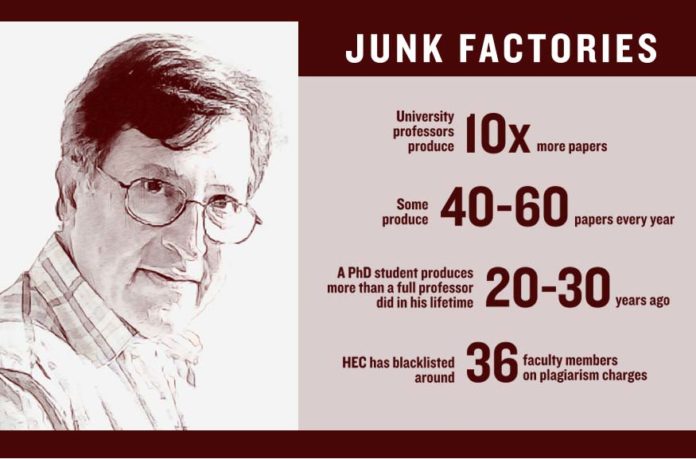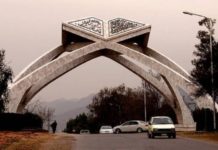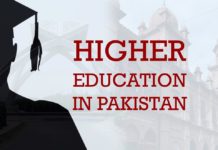In Brief
-
Quality of education is more important than quantity. Pakistan is churning out ‘miseducted’ post-graduate and PhD faculty and students.
-
Higher Education Commission (HEC) needs to focus on rewarding quality of “research” and its applications instead of offering cash prizes for vast quantities of worthless research that adds nothing to world’s body of existing scientific knowledge.
-
Dogmatic mindset needs to be weeded out of society. Teachers need to be trained especially. Instead of rote-learning and memorization of knowledge, students should be taught to pose questions and internalize knowledge so that they can apply it to solve real-life problems.
-
A PhD degree should be recognized only after the candidate passes a literacy test in that particular discipline.
A Massachusetts Institute of Technology (MIT) alumnus and preeminent physicist, Dr. Hoodbhoy is currently Zohra and Z.Z. Ahmad Distinguished Professor of Physics and Mathematics at Forman Christian College, Lahore. Earlier, he taught at the Quaid-i-Azam University for 40 years. He graduated from MIT with undergraduate degrees in electrical engineering and mathematics, a master’s in solid state physics, and a PhD in nuclear physics. In 1968, he won the Baker Award for Electronics, and in 1984, the Abdus Salam Prize for Mathematics. In 2003, he was awarded UNESCO’s Kalinga Prize for the Popularization of Science. In 2010, he received the Joseph A. Burton Award from the American Physical Society and the Jean Meyer Award from Tufts University. In 2011, he was included in the list of 100 most influential global thinkers by Foreign Policy magazine. In 2013, he was made a member of the UN Secretary General’s Advisory Board on Disarmament Affairs, a position he still holds today. He spoke to MIT Technology Review Pakistan about science and technology in context of higher education including teaching, capacity-building of professors, current situation at universities and research.
In your recent newspaper articles you have expressed strong dissatisfaction with the quality of scientific research in Pakistan. Why?
That’s because much of the time there is no actual research behind most of these so-called “research papers.” The Internet has placed at an author’s fingertips vast amounts of literature to freely cut and paste, invent data, and plagiarize ideas. Although software checks like Turnitin exist, they are next to useless. True, the ideal journal referee is supposed to be a know-all. But, in fact, he is too hard pressed to check everything, or may even be complicit. Publishing in fly-by-night journals, or arranging for your paper to be cited, is now a finely developed art form.
Our university professors are publishing huge numbers of research papers these days. Almost ten times more than a decade ago. Some produce as many as 40 to 60 papers every year. A PhD student now produces more over the course of his studentship than a full professor did in his lifetime 20 to 30 years ago. These papers appear in so-called international journals with high impact factors, are well-cited, and seemingly fulfil all requirements of high quality. They are a joke if you actually read them though. I have given several examples in my newspaper articles and will not repeat those here. The authors rake in cash prizes, national awards, and the Higher Education Commission (HEC) screams about the post-2002 “revolution” at every opportunity. Sadly, crime in Pakistani academia has overtaken even the legendary bribery of our police departments or the easy corruption of income tax authorities. Because it is now so thoroughly organized and systematized, dealing with academic heist won’t be easy.
Are you in principle uncomfortable with encouraging research, including theoretical and technical research, at universities in Pakistan? Do you think it’s just a waste of resources?
On the contrary, I think research – I mean genuine research – is very important to have at a university. First, even if it is not quite cutting edge, genuine research makes an individual much more aware of the state of the field and hence become a better, more exciting, lecturer. Book knowledge becomes stale fast, particularly these days. Second, knowledge is advanced only through research, and Pakistan should play a role in this someday. India is already doing so, and Iran has begun as well. Theoretical research in the sciences is intellectually harder and more demanding than simply making measurements. It also consumes far fewer resources. Thus, it should be strongly encouraged.
But since “research” is a widely abused term in Pakistan, some careful consideration of its meaning is necessary. Research in any professional field — mathematics or physics, molecular biology or engineering, economics or archaeology — does not have a unique, precise definition. But a tentative, exploratory definition might be that research is the discovery of new and interesting phenomena, creation of concepts that have explanatory or predictive power, or the making of new and useful inventions and processes. In the world of science, the researcher must certainly do something original, not merely repeat what is already known. Just doing something for the first time is not good enough to qualify as research. So, for example, one does not do meaningful research by gathering all kinds of butterflies and listing the number caught of each kind in a particular place at a particular time, etc. Nor does it come from making standard measurements, substituting one material after the other just because “it’s not been done before.” That’s mere alchemy, i.e., pretty useless.
The production of PhDs in Pakistan has increased hugely because of incentives provided by the HEC. Isn’t this a sign of progress?
It would be only if there was genuine learning associated with that degree. But, because of HEC policies that reward PhD supervisors and authors of worthless papers with cash and promotions, our universities have turned into junk factories. With apologies to the few genuine students and their supervisors, the fact is that PhD’s are awarded to all and sundry. A PhD degree should be recognized only after the candidate passes a literacy test in that particular discipline. Administered by some trustable overseas organization, the written test should be at the level of an undergraduate examination equivalent to that taken by students after their first year of studies at a good foreign university. Will this reduce our current PhD population by 50 percent, or 80 percent?
No country becomes wealthy by printing a mountain of paper currency. And no university system becomes better by dishing out substandard PhDs. Instead, the way forward lies in adhering to strict ethical standards, cultivating excellence, rejecting mediocrity, and nurturing a spirit of inquiry and intellectual excitement.
If not research, then what should be the priority for universities? Is it the improvement of pedagogical skills that should be the target?
Most university “teaching” amounts to a mere dictation of notes which the lecturer had copied down when he was a student in the same department, examinations are tests of memory, student indiscipline is rampant, and a large number of lecturers commit academic fraud without ever getting punished. In some universities the actual number of teaching days in a year falls far below the officially required number.
Other than developing robust administrative mechanics, it is crucial to have subject proficiency among university lecturers so that they actually understand the stuff they’re teaching to students. In fact, I would give 90 percent importance to re-teaching subject basics and only 10 percent to pedagogy. So, in fact, teaching lecturers “teaching-methods” is a very distant second priority. This means that they need to be retrained and then reevaluated.
But there would be a crucial difference: this time around they should be graded not by how much they have memorized but how well they are able to use what they have learned in order to solve problems. In science, knowledge is useful only if it is internalized rather than memorized. It must become part of your mental tool box.
There would be another important side benefit of having competent lecturers. I am convinced that if a lecturer knows his or her subject, and is able to comfortably solve all or most of the problems at the end of a textbook chapter, it would lead to important attitudinal changes. Some of the authoritarianism of lecturers would surely go away. This is a defense mechanism frequently used by lecturers. It is a fact that lecturers often discourage students from asking questions because they know that their lack of understanding would be exposed. This is lethal for an academic environment.
Pakistan has a big university system now but it is still very small. Access to higher education is still very limited. You have been very unenthusiastic about increasing numbers. Why?
It’s true that only a miniscule proportion, about five percent, of the eligible population has access to higher education. One wants greater enrollment but clearly somewhere one has to put a lower bound on quality. So, for example, there’s no point in having a department of English if the head of department can’t speak or write a straight sentence of English. In some colleges that’s actually the case. If we could establish universities that are actually genuine – in the sense that they actually teach something of value – I’d drop my objection instantly.
Although buildings and campuses can be rather easily constructed, Pakistan’s very limited intellectual resources put strong constraints on the number of actual higher education institutions that it can have. It’s like having an airline company with lots of planes but very few pilots. Would you like novices to take your planes up in the hope that they will learn flying that way? Of course not! Similarly we have entire universities, but with almost no people who are fit to teach in them. But they still teach, and nobody stops them. So although we don’t have crashed planes, we have armies of university students who have graduated but didn’t survive their miseducation. Therefore, they could never become good scientists, engineers, economists, or whatever. In the hard sciences, a miserable 20 to 30 percent of university lecturers are actually qualified to teach – and I’m being generous.
To fix this situation, I just don’t know of any way other than training lecturers in dedicated, specially created, teaching institutions where, at the end, they would be required to show proof through proper examinations that they’ve learned their subject well enough. It’s like a pilot certification requirement. If you don’t pass you are not allowed to fly – or teach. But I might add one caveat here: creating any good educational institution in Pakistan means that we will have to get at least some key people from other countries. Unless Pakistan stabilizes and deals with terrorism effectively, no persuasion will ever succeed in bringing them here. Or, perhaps, even expatriate Pakistanis. So this should be a super-priority.
Suppose you were put in charge of an organization with a mandate to reform the university system. What would be the single most pressing item on your agenda?
I would shift priorities drastically and emphasize improving the physical infrastructure of the 1,500 plus colleges rather than pampering a few public universities. Their laboratories, libraries, classrooms, hostels, and other basic things are in terrible shape. Of the available money and effort, I would put 90 percent towards improving teaching quality at our public universities and colleges. Only promising research would be supported. Today’s atrocious teaching quality comes largely from having university and college lecturers with very poor knowledge of their subject. So I would create large-scale lecturer-training academies in every provincial capital. Established with international help, these academies should bring in the best lecturers as trainers from across the country and from anywhere in the world. A few master trainers might be willing to come from western countries in spite the security situation, but hopefully attractive salaries might be able to lure some from India or from outside the Western world.
With the extreme scarcity of “scientifically-literate” lecturers, substandard faculty are frequently hired. What does one do with the ones that have been hired and can’t be fired?
This depends upon the extent of lack of subject competence. Clearly, before hiring faculty at any university, a test to check subject basics is absolutely essential even if the applicant has a PhD. It should be a national policy that applicants at the lecturer and assistant professor level should obtain more than a prescribed number of marks in a centrally set and administered subject test of high reliability. This test should be used only in a pass/fail mode — the final selection should take into account the usual criteria (publications, performance in a trial public lecture, etc.). But subject literacy should absolutely be the first criterion, not publication quantity. At the associate or full professorship, a public lecture must be made compulsory.
Here’s a suggestion that relies on the existence of huge numbers of distance learning courses, such as are available from Coursera, Stanford, and various other massive open online courses (MOOCs). Let’s say that a lecturer teaches his class using an appropriate module, and that his job is really that of a facilitator rather than someone who is defining the course material. In other words, he would be explaining the contents of a well-organized, high standard course and preparing students for the testing that would follow. In this way he would improve his own understanding as well, and the students would get something actually useful. Of course, this involves some expense but it doesn’t have to be very much. I think this could be a very promising direction.
Do you think that a religious mindset is an impediment to the development of science and technology?
When religion is stripped of spirituality and reduced to dogma, it deadens the mind. So whereas some level of functionality may still survive, the possibility of original thought and discovery becomes quite remote. In my opinion, the dogmatic mind can never be analytical or creative. After all, science is all about inquiry. It starts to develop naturally when students encounter questions that engage the brain’s reasoning and logical capabilities rather than memory capacity. To nurture it, lecturers need to raise such questions as: How do we know? What is important to measure? How do we check the correctness of measurements? What is the evidence? How do you make sense out of your results? Is there a counter-explanation, or perhaps a simpler one? The aim should be to get students into the habit of posing such questions and framing answers.
A dogma-driven society relies much more on rote learning because knowledge is seen as a fixed corpus of facts. Lecturers are supposed to transmit the “truth” as determined by some unapproachable authority. To that extent, science and traditional learning do not get along well. Joseph Needham’s marvelous treatise on Chinese science exposes this point in great detail regarding China. Many countries have been undergoing a massive cultural and social transformation over the decades. They are rapidly modernizing their values and ways of behavior. Not all the changes are good, of course, but the fact is that they are moving towards a way of thinking that is eminently suited for good, science-based education, hence, excellent technical universities and high educational standards.
It’s a different matter in strongly religiously-driven societies such as ours. Fixity and rigidity are much more ingrained and the resistance to modernity fiercer. This directly impacts pedagogy. The teaching of religion is necessarily authoritarian because religious knowledge is final, total, and unalterable – it all comes from God up above. If this attitude remained confined to Islamiat, it wouldn’t be a problem. But one inevitable by-product is that the reverential concept of knowledge filters all the way down into science subjects and their teaching. The notion of “up above” becomes fluid and extends into textbooks and lecturers, which lie almost beyond challenge.
Muslims and science got along famously for a good 400 to 500 years. But with present attitudes to life and knowledge, all the world’s laboratory equipment, computers, fast internet connections, and books won’t move us an inch towards genuine science and we would remain mere consumers of knowledge and its myriad products.
Our society is very susceptible to conspiracy theories and universities seem to be no different. Why don’t the lecturers of science subjects, who might be expected to be more rational and critical minded than others, not challenge them?
That’s because most lecturers learned from their lecturers, and they were exactly the same way. I’d say that scientific thinking is generally considered an alien, imported, western concept. Those who are paid to teach science often know next to nothing about the scientific method, the premises which underlie science, or its history. This also holds for the majority of lecturers who hold PhDs from our universities. In fact many – whether actively or implicitly – work against the idea system of science.
Developing the arts and sciences on campuses requires a different set of conditions. Would you agree?
Only partially, because some of the conditions needed are common. A good university, whether primarily arts or science oriented, needs adequate infrastructure, an administrative system with in-built checks and balances, a spirit of collegiality among the faculty, and a system of rewards and punishments that is seen to be transparent and fair.
Literature, art, music, and sculpture need even more because they are expressions of creative expression. If you want them then you must first fight the battle for increasing the space available for increasing political, cultural, and personal expression. Without this freedom all the money in the world, and the finest buildings will achieve exactly nothing. The starting point is to acknowledge that we actually want the arts.
Presently, it is not clear that anything beyond narrowly technical education is desirable or socially sanctioned. Unlike during the earlier years of Pakistan, today we see that film, drama, dance, and music are frowned upon within the campuses of most public universities. Joyous or artistic expressions are sometimes attacked by student vigilantes who say these violate religious norms. At Punjab University, the Islami Jamiat Talaba staged violent protests against the establishment of a department of musicology. Even when something low-key was finally established, it had to be located away from the main campus. Today cafeterias in some universities are segregated, men and women are not allowed to walk together, and morality squads enforce these restrictions with due fervor. Personal freedom is crucial to creating a well-rounded individual. It is particularly important to learn to deal with colleagues of the opposite sex in a mature way.







